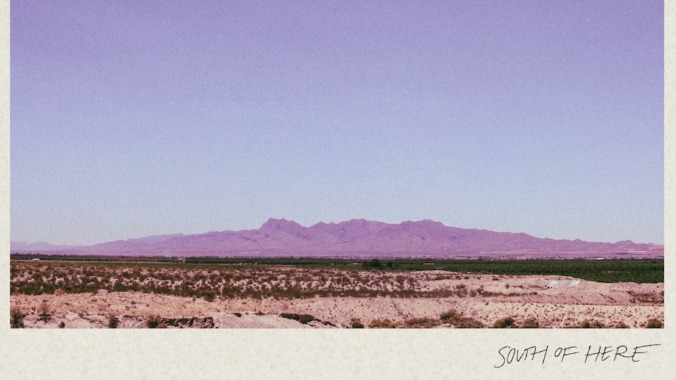Nathaniel Rateliff and the Night Sweats Aim For Stadiums on Uneven South of Here
The St. Louis-born singer-songwriter and his band get ambitious on their fourth album together but fall into traps of pastiche that are uncharacteristic for the beloved rock unit.
Music Reviews Nathaniel Rateliff
We have seen many different sides to Nathaniel Rateliff over the years. After releasing a collection of minimalist singer-songwriter tunes with his 2007 debut Desire and Dissolving Men, Rateliff followed up with 2010’s In Memory of Loss, a tasteful folk album that invited comparisons to Bill Callahan and Bon Iver. Then, Rateliff moved further towards the mainstream with his third album in 2013, which took cues from the stomp-clap folk-rock of Mumford & Sons, and the Lumineers. In 2015, he took a surprise swing at soul with his newly formed band the Night Sweats and briefly returned to his minimalistic singer-songwriter roots on 2020’s And It’s Still Alright—a moving meditation on producer Richard Swift’s death and Rateliff’s then-recent divorce.
This career-spanning eclecticism carries through to Rateliff’s newest album with the Night Sweats, South of Here, which traverses soul, Southern rock, folk, Americana and more—reliably tackling universal desires and doubts with stadium-sized ambition and cinematic scope. On “Get Used to the Night,” the 45-year-old effectively uses dynamic contrast and the full force of his band to make past traumas, lingering doubts and the cruelty of aging inescapable. “I used to know it all / Now I can’t remember much, man / I used to be a proud fucking fool,” cries Rateliff, as his band rallies behind him while horns and drums swell.
Elsewhere, Rateliff falls flat in his cinematic ambitions—as showcased on opener “David and Goliath.” As its title suggests, the song aims to be a heroic underdog anthem. The same piano keys are bashed, the same bass drum is kicked incessantly, and a lightly chaotic guitar riff takes center-stage in the song’s second half—all while Rateliff lightly howls. The forced melodrama of it all is endless, yet the final statement is muddled and diminished. An overbearing rock opera opener, “David and Goliath” is all at once too much and too little—despite how much is going on, it’s also too cleanly produced, and Rateliff sounds uncharacteristically afraid of utilizing the full strength of his commanding voice.
Rateliff sets the stage more effectively on the following “Heartless,” a classic rock-imbued chapter that elicits parallels to Zach Bryan’s recent self-titled album. Rateliff’s propensity for straightforward confessionals works in the song’s favor (“I wanna feel something honey, I wanna feel something good”) and leads to a more affecting overall statement. Once again, however, he stumbles when he looks to expand the song’s scope. Rising horns and harmonies of “oohs,” combined with the guitar and drum arrangements, seem designed to replicate the life-affirming thrill of Bruce Springsteen’s music. But, more often than not, it evokes Mumford and Sons, or the colorless Boss pastiche of Jack Antonoff’s Bleachers, rather than something attuned to the Night Sweats’ talents.
There are greater successes in South of Here’s more subdued moments. In the album’s quieter stages, “Everybody Wants Something” recalls the cathartic Southern rock of Jason Isbell and gives way to one of the LP’s most evocative, lived-in lyrics (“Breaking into the night / We were coming of age / We were just running around trying to be kids / Everyone don’t need to be saved”). The song ends with what could easily be the album’s mission statement: “I was tryna see the world for everything that I could be.” Mixed results aside, there’s no doubting Rateliff’s conviction here in trying to create life-affirming anthems that interrogate our place on this planet at this moment.
Across the remainder of South of Here, Rateliff tries his hand at more stadium-sized tunes—with two of the boldest tracks coming at the record’s end: “Call Me (Whatever You Like),” a fun, messy number that alludes to 2000s alt-rock, and “Time Makes Fools of Us All,” a passionate, bar-closing rocker that excellently toes the line between emotional release and not taking itself too seriously. In the context of the album, the former is a clunky addition that fares better when standing alone. The latter is the LP’s most infectious and memorable installment—a reminder of Rateliff’s talents when he and his band are firing on all cylinders. “Center of Me” succeeds, too, as its runtime is filled with existential questioning. The song strips back much of the excessive arrangements that dominate South of Here and places Rateliff’s gruff, powerhouse voice into focus. “I’m just gonna close my eyes and try to play it cool,” sings Rateliff. It’s a remarkably compelling statement that proves that, most of the time, the greatest emotional breakthroughs arrive when we finally admit how much we don’t know.